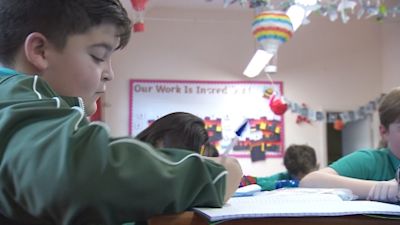Welsh schools trial longer days to recover from the pandemic

Fourteen schools in Wales are trialling longer school days to help students affected by the pandemic to recover.
Over 1,800 young learners will take part in the ten-week trial.
Primary and comprehensive schools taking part will receive up to £2 million of funding to pay for an extra five hours of learning time a week.
The scheme is a commitment of the Welsh Government’s Co-Operation Agreement with Plaid Cymru and the next steps of the trial will be considered with Plaid Cymru as part of the agreement.
Teachers get to decide what activities or lessons are delivered in each school and one college during the trial period.
'Support learners to re-engage'
Jeremy Miles MS minister for education and Welsh Language said: “Programmes which provide a enriching and stimulating additional sessions and support learners to re-engage with learning can have a greater impact on attainment than those that are solely academic in focus.
"We will be learning how these additional sessions might improve well-being, academic progression and increased social and cultural capital."
Kim Fisher, headteacher of Windsor Clive Primary, said he wanted to make up for the experiences the children of Windsor Clive had missed out on during the pandemic.
"All children have missed out because of the pandemic not necessarily from a physical point of view but from a social side from a wellbeing point of view.
"The uptake has been absolutely amazing, the parents are very enthused. We had 60 places for our children but we were oversubscribed, which was great."
The Cardiff headteacher said that this was a voluntary opportunity for his staff and they were being paid for the additional hours.
"About a third of our staff have signed up to take part in delivering some of the enrichment programmes. Some of our staff can't because of certain reasons.
"The children are engaging in lots of different activities they haven't done before. They have lots of fun with their friends in school with our own staff and hopefully learn some new skills in the process."
Tomas Rice, who is in Year 6, said PE, acting and World War Two music are the most fun elements to the after school sessions.
"It's better, it's all about us, and we are getting healthier doing sport, and that's what kids want to do," he said.
The last two years have been turbulent for children but Tomas is feeling the benefits of the longer school hours.
He said: "Two years have been manic, in and out and out. I wouldn't be surprised if we went back in [to lockdown] but we didn't thank God.
"It's good again because it feels like stuff is going back to normal but getting out and going back in lockdown and not having the full capability to go on holiday [was the worst]."
However, unions have voiced their doubts about the plans to extend the school day.
The national union for school leaders says they have yet to be provided with any evidence that supports extending the school day.
"Schools are not childcare providers"
A spokesperson said: “All the focus from the government has been on the school day fitting in with family life and working patterns, with no mention of the education benefit to learners. All the evidence available suggests that there is little or no data that supports keeping learners in school for longer because longer periods in school does not increase a child’s capacity to learn.
“If the government’s plan is to support working families with a national childcare offer, then they should come out and say that. Schools are not childcare providers and our profession of dedicated school leaders, teachers and support staff should not be expected to take on additional work and responsibility to do this."
"The profession is trying to support learners with covid recovery, focus on curriculum development and ALN reform, prepare for new assessment and Estyn arrangements and deal with the implications of exams and new qualifications. When schools are under so much pressure as it is, I do not understand why this is even a priority at the moment.
“We urge the government to be honest and clear with the profession about the motivation behind reforming the school day."